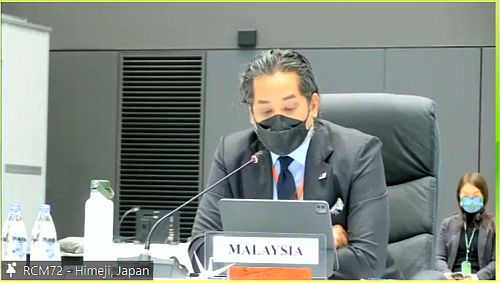KUALA LUMPUR, Oct 26 — Malaysia today told the World Health Organization (WHO) that it has set up a bipartisan task force to address the issue of stunting among children in the country.
“Malaysia continues to remain concerned about the double burden of malnutrition on children. We have set up a bipartisan, whole-of-government task force to address the issue of stunting among some of our children in Malaysia,” Health Minister Khairy Jamaluddin said in delivering the country’s statement at the 72nd WHO’s Western Pacific regional committee meeting in Japan.
Malaysia suffers a triple burden of malnutrition, namely obesity, anaemia, and stunting.
According to a report by the Jeffrey Cheah Institute on Southeast Asia and the Jeffrey Sachs Centre on Sustainable Development in 2019, two out of 10 Malaysian children below five are stunted, far worse than the seven per cent prevalence in the conflict-ridden West Bank and Gaza.
Another account by the 2020 Global Nutrition Report suggests that Malaysia is worsening in efforts to cut the number of stunted children under five. Malaysia’s national prevalence of stunting in children under five years was 20.7 per cent in 2016, rising from 17.2 per cent in 2006. The developing country average is 25 per cent.
Meanwhile, Khairy said Malaysia will soon regulate e-cigarettes or electronic nicotine delivery systems (ENDS) so that they do not become accessible to schoolchildren.
“Malaysia would like to raise the issue of the campaign on tobacco control for health-promoting schools. In particular, we would like to focus on electronic nicotine delivery systems (ENDS), and a common position on the prevalence of ENDS among school children.
“Malaysia will soon be joining some other member states in regulating ENDS, especially in ensuring that they do not become accessible for school children,” he said.
Khairy also highlighted the impacts of the Covid-19 pandemic, particularly school closures, on children’s mental health and wellbeing. He said this is further exacerbated by social media’s influence in shaping children’s thoughts, feelings, and behaviours.
“It is imperative schoolchildren should be given adequate mental support. In this regard, Malaysia will place more resources and efforts in providing the necessary interventions for students who need assistance, especially through using technology tools that may be more familiar for a digitally native generation,” Khairy said.
He also reiterated Malaysia’s call against Covid-19 vaccine inequity for children when it is approved.
“We must ensure that schools will no longer be shut. That is why Malaysia would like to once again call for the equitable distribution of Covid-19 vaccines for children when they get regulatory approval. This will protect all our children to learn safely at their schools. Please do not repeat the inequitable delivery commitments that we are seeing for vaccines to date.”








